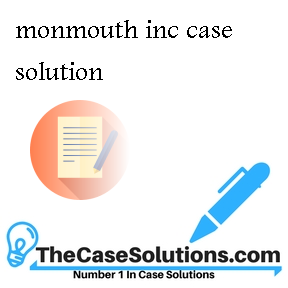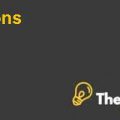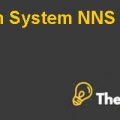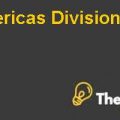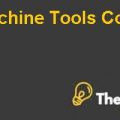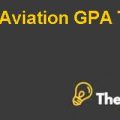Sample:
2.What is the maximum price that Monmouth can afford to pay, based on a discounted cash flow valuation? Based on market multiples of EBIAT?
ANSWER 2.
Our approach in calculating the maximum price that Monmouth can afford to pay will be:
1. Determine the cash flows for years 1 to N
2. Calculate the appropriate discount rate
3. Calculate the terminal value at end of year N
4. Calculate the present value of the cash flows and of the terminal value and sum these two numbers, which is equal to the value of the firm
5. Subtract the value of debt to obtain the value of equity.
Based on the calculation provided in (sheet 2) Table 2, DCF valuation and using a WACC of 8.25% (the beta assumed to be 0.96, the average beta of comparable firms as beta isn’t given for Robertson and the coupon rate will be 7.96%, the rate for BB rated companies, we assume Robertson to be BB company as most of its ratios match the medium values of BB rating) and a market risk premium rate 6%, which is given already in the data. The cost of debt will be 12m of long-term loan; interest will be calculated with the help of interest given in in income statement.
The fair price is $40.4 per share for Robertson, lower than the $50 offered by Simmons to sell their stocks but higher than the current market price of $30. As for the peer multiples, and due to the lack of information for the comparable companies we only managed to calculate the EBIAT multiple, the earnings multiple and the book value multiple using the three comparable companies, Actuant Corp, Snap On Inc. and Stanley Works. The result of the multiple valuation showed a fair price of $40.1 per share based on the EBIAT multiple and a value of $29.61 per share based on the earnings multiple. Both prices are below the fair price calculated by the DCF. Only the book value multiple exceeded the DCF fair value with a value of $66.48. The first two multiples failed to capture the future potential and growth of the corporation, where the DCF managed to include it as a factor in the calculations.
Monmouth Incorporation Case Solution
The maximum price for Robertson Tools Company is 66.48 $ per share which Monmouth should pay, this result is based on analysis of valuation using discounted cash flow, calculation of Weighted Average Cost of Capital (WACC) and terminal value determination with inflation growth rate at 2%. Therefore, Monmouth can gain potential profits out of merger, as Robertson has all prospects of its position improvement with current stock price being undervalued..........................
This is just a sample partial case solution. Please place the order on the website to order your own originally done case solution.

